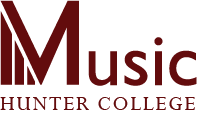All Graduate students in Music at Hunter College must take various proficiency exams in music history, dictation, music theory, keyboard skills and sight singing (guidelines for the exams are found below). M.A. students also need to take a foreign language proficiency exam (Music TEP students do not need the foreign language exam). These exams test skills we assume that you should have learned as undergraduate music students.
To find out when exams will be given during the upcoming school year, click here. Although there is no penalty for failing the exam, students whose proficiency exam test scores suggest special problem areas might be asked to take remedial undergraduate courses to remedy these weaknesses. In any case, students can retake any or all of the parts of the proficiency exams.
Each student must take these tests upon beginning the program (after receiving official acceptance from the Admissions Department), and must pass the proficiency exams before completing more than 18 credits towards their degree.
Guidelines for the Proficiency Exams
Dictation: The dictation exam consists of rhythmic dictation exercises; melodic dictation exercises; identification of intervals, chords, and harmonic progressions.
Sight singing: In the sight singing exam, students will be asked to sight sing a short excerpt, without stopping, using correct pitches and rhythms (use of solfege syllables is entirely optional). Students have the additional option of bringing a prepared solfege exercise to the exam, which might help in borderline cases.
Keyboard skills: The keyboard exam consists of four sections: (1) demonstration of keyboard proficiency by playing a short piece on the piano (students who have a concentration in Piano Performance are exempt from this requirement); (2) sight reading a simple piece on the piano (students who have a concentration in Piano Performance will be asked to sight read a more complicated piece); (3) demonstration of basic theory knowledge by playing scales, triads, and intervals on the piano (for instance, a student might told to “play a C# melodic minor scale” or a “D diminished triad).
Theory: Harmonizing (in four parts) a short melodic progression and realizing a figured bass.
Language: Using a dictionary, translate into English a short passage in a foreign language of your choice. (Note: Music TEP students do not need to take the foreign language exam.)
Music History: The Music History proficiency is in two parts: part 1 is devoted to pre-1750 music, part 2 is devoted to post-1750 music.
Most exams take an hour to complete (with the exception of the dictation exam, which takes around one-half hour, and the keyboard skills and sight singing exams, which take about 5 minutes each). Please note that there is no penalty for failing an exam; students who fail an exam may retake it until they pass. If after reading the guidelines above you remain confused, you should nevertheless plan to take the exams at your earliest possible convenience–that way, even if you need to retake the exam, you will at least be more prepared for the exam the following time.
The best way to prepare for these exams is to study your notes from your undergraduate and graduate classes, and then to take an exam during the assigned exam time as a practice.




